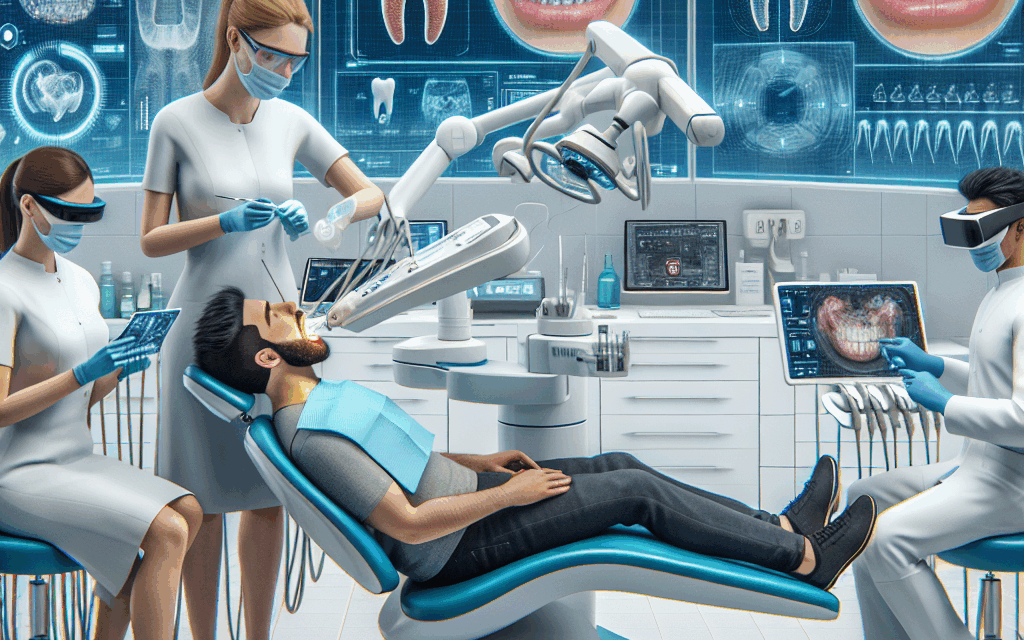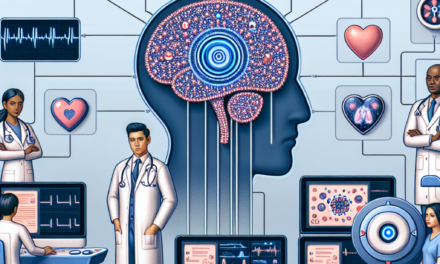Harnessing AI: Transforming Dental Practices for the Future
The integration of artificial intelligence (AI) into various sectors has revolutionized how businesses operate, and the dental industry is no exception. As technology continues to advance, dental practices are increasingly adopting AI-driven solutions to enhance patient care, streamline operations, and improve overall efficiency. This article explores the transformative impact of AI on dental practices, focusing on five key areas: diagnostics and treatment planning, patient engagement and communication, operational efficiency, training and education, and ethical considerations in AI implementation.
1. AI in Diagnostics and Treatment Planning
One of the most significant applications of AI in dentistry is in diagnostics and treatment planning. AI algorithms can analyze vast amounts of data, including medical histories, imaging results, and patient demographics, to assist dental professionals in making informed decisions.
AI-powered diagnostic tools utilize machine learning algorithms to identify patterns in dental images, such as X-rays and CT scans. For instance, a study published in the journal *Nature* demonstrated that AI systems could detect cavities and other dental issues with an accuracy comparable to that of experienced dentists. These tools can significantly reduce the time required for diagnosis and increase the accuracy of treatment plans.
- Enhanced Imaging Analysis: AI can analyze dental images more quickly and accurately than traditional methods. For example, software like Pearl and Overjet uses deep learning to identify potential issues in radiographs, allowing for earlier intervention.
- Predictive Analytics: AI can predict the likelihood of future dental issues based on a patient’s history and current conditions. This predictive capability enables dentists to implement preventive measures, ultimately improving patient outcomes.
- Personalized Treatment Plans: By analyzing data from various sources, AI can help create customized treatment plans tailored to individual patient needs, enhancing the effectiveness of care.
Case studies have shown that practices utilizing AI for diagnostics have reported improved patient satisfaction and reduced treatment times. For example, a dental clinic in California implemented an AI diagnostic tool and saw a 30% reduction in the time taken to diagnose dental issues, leading to quicker treatment initiation and better patient outcomes.
Moreover, AI can assist in treatment planning by simulating various scenarios and outcomes based on different treatment options. This capability allows dentists to present patients with multiple treatment pathways, enhancing patient understanding and involvement in their care decisions.
2. Enhancing Patient Engagement and Communication
Effective communication is crucial in dentistry, as it fosters trust and ensures that patients are well-informed about their treatment options. AI technologies are transforming how dental practices engage with patients, making communication more efficient and personalized.
Chatbots and virtual assistants powered by AI are becoming increasingly common in dental practices. These tools can handle routine inquiries, schedule appointments, and provide information about procedures, freeing up staff to focus on more complex tasks. For instance, a dental practice in New York implemented an AI chatbot that reduced appointment scheduling time by 50%, allowing staff to dedicate more time to patient care.
- 24/7 Availability: AI chatbots can provide immediate responses to patient inquiries at any time, improving accessibility and patient satisfaction.
- Personalized Communication: AI can analyze patient data to tailor communication, sending reminders for appointments or follow-up care based on individual needs.
- Feedback Collection: AI tools can facilitate the collection of patient feedback through surveys, helping practices identify areas for improvement.
Furthermore, AI can enhance patient education by providing tailored information about procedures and aftercare. For example, AI-driven platforms can deliver personalized educational content based on a patient’s treatment plan, ensuring they understand the importance of their care regimen.
Research indicates that practices that leverage AI for patient engagement see higher levels of patient satisfaction and retention. A study conducted by the American Dental Association found that practices using AI communication tools reported a 20% increase in patient retention rates, highlighting the importance of effective engagement strategies.
3. Streamlining Operational Efficiency
Operational efficiency is vital for the success of any dental practice. AI technologies can streamline various administrative tasks, allowing dental professionals to focus more on patient care rather than paperwork.
AI can automate appointment scheduling, billing, and insurance claims processing, significantly reducing administrative burdens. For instance, software solutions like Zocdoc and Dentrix Ascend utilize AI to manage appointments and patient records, minimizing scheduling conflicts and improving overall workflow.
- Automated Billing: AI can streamline the billing process by automatically generating invoices and processing payments, reducing errors and improving cash flow.
- Inventory Management: AI systems can monitor inventory levels and predict supply needs based on historical data, ensuring that practices are well-stocked without over-ordering.
- Data Management: AI can help manage patient records more efficiently, ensuring that data is easily accessible and up-to-date, which is crucial for providing quality care.
Case studies have shown that dental practices implementing AI-driven operational tools have experienced significant improvements in efficiency. For example, a dental group in Texas reported a 40% reduction in administrative time after adopting an AI scheduling system, allowing staff to focus more on patient interactions.
Moreover, AI can assist in workforce management by analyzing staff performance and patient flow, helping practices optimize staffing levels based on demand. This capability ensures that practices can provide timely care without overstaffing or understaffing, ultimately improving patient satisfaction and staff morale.
4. Training and Education for Dental Professionals
The rapid advancement of AI technologies necessitates ongoing training and education for dental professionals. As AI becomes more integrated into dental practices, it is essential for practitioners to understand how to leverage these tools effectively.
AI-driven training platforms can provide personalized learning experiences for dental professionals, allowing them to stay updated on the latest techniques and technologies. For instance, platforms like Dental Intelligence offer AI-powered analytics that help practitioners identify areas for improvement in their skills and knowledge.
- Continuous Learning: AI can facilitate continuous education by providing access to online courses, webinars, and resources tailored to individual learning needs.
- Simulation Training: AI-powered simulation tools can offer hands-on training experiences, allowing dental professionals to practice procedures in a risk-free environment.
- Performance Analytics: AI can analyze practitioners’ performance data, providing insights into areas where additional training may be beneficial.
Furthermore, AI can assist in mentoring and peer collaboration by connecting dental professionals with experts in their field. For example, platforms like DentaVox utilize AI to match practitioners with mentors based on their specific needs and goals, fostering a culture of continuous improvement.
Research indicates that practices that invest in ongoing training and education for their staff see improved patient outcomes and higher levels of employee satisfaction. A study published in the *Journal of Dental Education* found that practices with robust training programs reported a 25% increase in patient satisfaction scores, underscoring the importance of investing in professional development.
5. Ethical Considerations in AI Implementation
As dental practices increasingly adopt AI technologies, ethical considerations must be at the forefront of implementation strategies. The use of AI raises important questions about data privacy, informed consent, and the potential for bias in algorithms.
Data privacy is a significant concern, as dental practices handle sensitive patient information. It is crucial for practices to ensure that AI systems comply with regulations such as the Health Insurance Portability and Accountability Act (HIPAA) to protect patient data. Implementing robust cybersecurity measures and ensuring transparency in data usage are essential steps in addressing these concerns.
- Informed Consent: Patients should be informed about how AI technologies are used in their care and the implications for their treatment. Clear communication about the role of AI in diagnostics and treatment planning is essential for building trust.
- Bias in Algorithms: AI systems can inadvertently perpetuate biases present in training data. It is crucial for dental practices to regularly evaluate AI algorithms to ensure they provide equitable care across diverse patient populations.
- Accountability: Establishing clear lines of accountability for decisions made by AI systems is essential. Dental professionals must remain involved in the decision-making process to ensure that patient care is prioritized.
Case studies have highlighted the importance of addressing ethical considerations in AI implementation. For example, a dental practice in Florida faced backlash after a data breach involving patient information used by an AI system. This incident underscored the need for stringent data protection measures and transparent communication with patients regarding data usage.
In conclusion, while AI presents numerous opportunities for enhancing dental practices, it is essential to approach its implementation thoughtfully and ethically. By prioritizing patient privacy, informed consent, and algorithmic fairness, dental practices can harness the power of AI while maintaining the trust and safety of their patients.
Conclusion
The integration of AI into dental practices is transforming the industry, offering innovative solutions that enhance patient care, streamline operations, and improve overall efficiency. From diagnostics and treatment planning to patient engagement and operational efficiency, AI technologies are reshaping how dental professionals deliver care.
As dental practices continue to adopt AI-driven solutions, it is crucial to prioritize ongoing training and education for practitioners, ensuring they are equipped to leverage these tools effectively. Additionally, addressing ethical considerations surrounding data privacy and algorithmic bias is essential for maintaining patient trust and delivering equitable care.
In summary, the future of dentistry is bright with the potential of AI. By harnessing these technologies responsibly, dental practices can not only improve patient outcomes but also create a more efficient and effective healthcare system. As we move forward, the collaboration between dental professionals and AI will undoubtedly shape the future of dental care, paving the way for a new era of innovation and excellence in the field.





